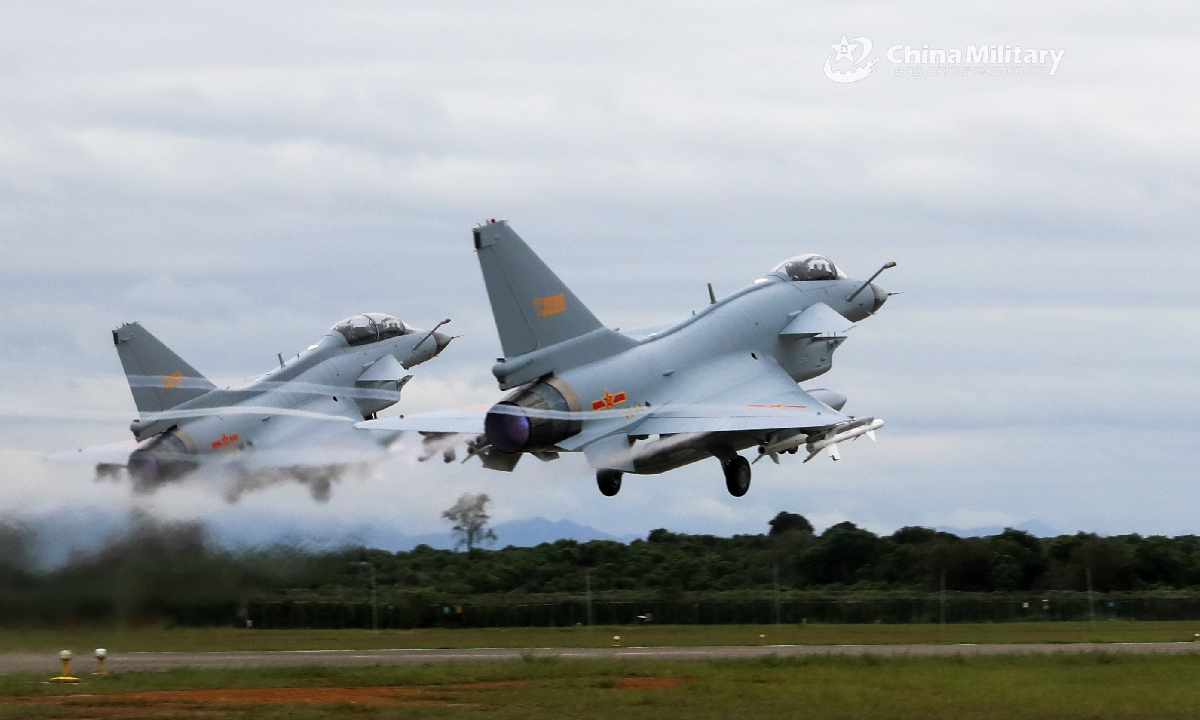China to add threats to its development interests as reason for defense mobilization
Source: Global Times Published: 2020/10/22 15:18:40

Two J-10 fighter jets attached to an aviation brigade of the air force under the PLA Southern Theater Command take off simultaneously from the runway during a ferry flight training exercise on October 16, 2020. (eng.chinamil.com.cn/Photo by Gu Haodong)
China is mulling amending its Law on National Defense amid the profound changes in the world situation over the past two decades by adding key formulations, including citing threats to the country's development interests as reasons for defense mobilization, and involvement in global security governance.
The amendment draft to the Law on National Defense was released on the website of the National People's Congress (NPC) on Wednesday, soliciting opinions from the general public from Wednesday to November 19, after the draft was deliberated by the NPC Standing Committee at a plenary session in Beijing. General Wei Fenghe, a Central Military Commission (CMC) member, a State Councilor and the Minister of National Defense, explained the draft, the Beijing Youth Daily reported on Wednesday.
Wei said that the current Law on National Defense that came into effect in 1997 cannot fully adapt to the new missions and requirements for the development for national defense and the Chinese military, and needed to be amended.
The world's strategic situation has undergone profound changes over the last 20 years, as the world saw international strategic competition on the rise, continually increasing global and regional security issues, non-stop armed conflicts and regional warfare, and increasingly obvious instability and uncertainty in international security, Wei said.
Wei also noted that China is in a key period of strategic opportunity for development and is facing even more complicated security threats and challenges.
The draft amendment states that when China's sovereignty, unity, territorial integrity, security and development interests are under threats, the country can conduct nationwide or local defense mobilization. The "development interests" part is a new addition to the current law.
In another proposed addition to the law, the draft amendment said that China could use its armed forces to protect overseas Chinese citizens, organizations, units and facilities, thus safeguarding China's overseas interests, and participating in activities including UN peacekeeping missions, international rescue, maritime escort, joint exercises and anti-terrorism following the basic rules on international relations based on the principles of the UN Charter.
China will participate in global security governance, join multilateral security talks and push for and set up a set of international rules that is widely accepted, fair and reasonable, the draft amendment states.
Besides border, maritime and air defense, the draft amendment also states that the country should take necessary measures to safeguard activities, assets and other interests in other key security fields including outer space, electromagnetic space and networks.
Public servants should play leading roles in national defense education, and the flags and emblems of the People's Liberation Army and the People's Armed Police Force should be respected, the draft amendment said.
It also made some adjustments to the function and power of the State Council and the CMC, which reflect corresponding changes in military reform, analysts said.
Global Times
Posted in: MILITARY